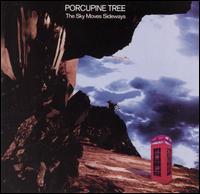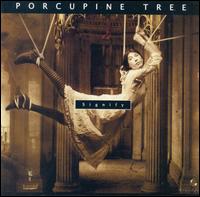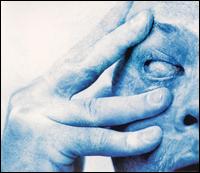


Don't Hate Me
A Floyd Fan's Introduction to Porcupine Tree
by Patrick Keller
Talk of "prog rock" inevitably conjures thoughts of hippies in fringe-covered jackets playing 30 minutes of Brahms variations on the Farfisa. Audiences could only take so much of this, however. Most of the prog bands that survived the 70s either turned to pop (Genesis, Yes), or saw their audience dwindle (Emerson, Lake & Palmer, and, well, Yes). Rarely did they evolve with the times, or indeed at all, choosing instead to play to the same group of fans they always had, who like it that way. The quote (taken from Paul Stump's book The Music's All That Matters) goes, "The last thing a progressive rock fan wants a band to do is progress."
While many of those bands still linger, the torch was picked up by a number of "progressive metal" bands like Fates Warning and Dream Theater, who they mainly picked up on the former genre's excesses: the shifting time signatures, the extended songs and suites, the solos. Dear God, the solos...
A few bands, however, have taken the spirit of prog rock to heart. Rock music can achieve more than just verse/chorus/verse teenage angst or paeans to sex and drugs. Two bands to watch here have quite a bit in common, not the least of which are the initials 'PT', and also an aversion to the tag "progressive rock." And given some of the other bands that have carried that tag (the subject of this website excluded, of course), it's hard to blame them.
 On the Sunday of Life |
Both Porcupine Tree and Pineapple Thief started off as side-projects for musicians in other, modestly successful, bands. Porcupine Tree grew out of No-Man, or rather, grew in reaction to it, as an outlet for Steven Wilson's experimentation, which didn't really fit with that band's more polished, pop-focused music. Wilson and a friend had jokingly invented a faux 70s art rock group named Porcupine Tree (a likely name for such a group), complete with an extensive history, biographies for the band's members, and a bizarre discography. He then recorded more than two hours of music for this invented band, which eventually saw release on the cassettes Tarquin's Seaweed Farm and The Nostalgia Factory. These tapes attracted some attention from various labels around London, eventually getting Wilson signed to the Delerium label, who collected the best tracks from those two tapes onto On the Sunday of Life, with the remainder landing on the limited release Yellow Hedgerow Dreamscape.
These two albums sound very much like the experiments they were. The tracks have very little relationship to one another, and veer off into bizarre tangents that fail more often than they succeed. Wilson himself looks back on the album as a roadmap of all the different directions Porcupine Tree could have gone in, and indeed, he later explored many of them in side-side-projects like IEM, Bass Communion, and Blackfield. The roots of what would appear in later "proper" Porcupine Tree albums lie in tracks like "Radioactive Toy" and "Nine Cats," with their somewhat more traditional structure, dark lyrics, and Gilmour-esque guitar playing.
 Voyage 34: The Complete Trip |
Wilson followed Sunday with the extended single, "Voyage 34," which samples an old record of a Dick Clark soundalike detailing one unlucky stoner's bad trip. The single owes more to dance and ambient music than Syd Barrett, though the guitar part could very easily have been lifted from "Run Like Hell." (The single came in a variety of permutations, which were later collected in Voyage 34: The Complete Trip.) Wilson says that, after the nostalgic style of the last album, he needed to demonstrate some versatility by taking on a "strong contemporary feel." This was indicative of Wilson's approach to all future Porcupine Tree releases, which never seem to stagnate in one style or another, but can shift dramatically from one record to the next.
"Voyage 34" was actually recorded for Porcupine Tree's next album, Up the Downstair, but was lifted off because the label wanted to avoid another double album. Downstair finds Wilson still flirting with dance rhythms and psychedelia. There are also several tracks that extend beyond the six-minute mark, with two clocking in past 10. The music is quite enjoyable, with "Always Never" and "Fadeaway" providing a solid glimpse of Wilson's future style, but the mix seems flat somehow, due at least in part to the computerized drums. Much like the Floyd, these songs were merely blueprints for expanded or improved live versions, an arena that Wilson was eager to move into, though he was stymied by the lack of an actual band to perform them. On Downstair, he was beginning to assemble the personnel that would eventually change Porcupine Tree from a one-man show into a true group. Pulling various former collaborators from assorted projects he'd worked on in the past, Wilson recruited Colin Edwin (bass), Chris Maitland (drums), and Richard Barbieri (keyboards), and the group performed their first live shows in 1993, which are documented on the now out-of-print release, Spiral Circus.
(One of Wilson's more frustrating peculiarities is his devotion to limited edition releases, which can be a considerable frustration to new fans. Fortunately, the major releases tend to stay in print, but others disappear forever, which leads to a thriving trade in bootlegs and on eBay.)
 The Sky Moves Sideways |
The next album, The Sky Moves Sideways, would only feature the entire band on half the tracks, with the other half produced by Wilson solo, á la Sunday and Downstair. (Sideways would later be re-released in much-improved form with real drums replacing the programmed ones, and a full disc of bonus tracks.) This album is often pointed to as the most Floydian of all Porcupine Tree's releases, in no small part because the form is nearly identical to Wish You Were Here's: one epic track bookending three shorter ones. Wilson's guitar playing also bears a heavy likeness to Gilmour's here, and this album would likely be a good place to start for a fan of 70s-era Floyd to dive in.
Wilson reacted poorly to the Floyd comparisons, and has worked ever since to shake it off however he could. Have no fear though: Porcupine Tree's music remains strongly grounded in the fundamentals that made Pink Floyd such an enduring group--strong songwriting, multifaceted lyrics, solid musicianship, a willingness to experiment, a keen sense of melody, and a focus on the darker aspects of the human condition. Many bands emulate the Floyd but miss the essence that made the group so powerful. Wilson "gets it," moreso than any other band going, I would venture. No matter how far he may veer from the style of Pink Floyd, he is never far from their spirit.
 Signify |
The next album, Signify, would be the first genuine band effort, and it also marked a move away from the ambient and dance influences, toward a tighter "song-based" approach. The album also produced a modest hit for the group, "Waiting (Part One)," as well as my own personal favorite Porcupine Tree song, "Dark Matter," which has such a stunning beauty that it's nearly heartbreaking to listen to. The album is more consistent and listenable than any that precedes it, and even has a concept of sorts. As the title hints at, the lyrics concern themselves with the various ways in which humans attempt to make their lives significant.
Porcupine Tree had now achieved considerable success as a touring unit, which was documented in the live album, Coma Divine. As live albums go, this one resembles Delicate Sound of Thunder in many ways: beautiful but almost too serene for a document of a live show. However, Wilson & Co. manage to considerably improve upon many of the early Porcupine Tree tracks simply by putting them in a full band context.
 Stupid Dream |
The band spent a great deal of time preparing their next album, which I consider to be the group's crowing achievement: Stupid Dream, if only because it contains the masterpiece "Even Less." The tune is Porcupine Tree's own heavier version of "Shine On You Crazy Diamond," with epic song structure, and lyrics dedicated to the remembrance of a lost friend. (It's worth noting that "Even Less" was my first exposure to the band, a testimonial for file sharing if ever there was one: After hearing countless people suggest the band, I grabbed a live version of this track performed at the House of Blues from some p2p program, and instantly fell in love. Subsequently, I bought everything I could find from the group, and became one of its biggest boosters. Take that, RIAA...) Dream has few of the excesses of past releases: It's tighter, more focused, and polished, though not overproduced. There's the pop bounce of "Piano Lessons," the full-tilt "Slave Called Shiver," the grim beauty of "Stop Swimming"... The album has range without feeling disconnected. Later albums may achieve the occasional higher height, but they never manage this consistency.
The next release, Lightbulb Sun, comes close, however, but falters now and then because of Wilson's willingness to make the occasional play for pop radio exposure. The heights it achieves, however, are astounding: "Last Chance to Evacuate Planet Earth" is disquieting yet radiant. "Four Chords that Made a Million" could be called Porcupine Tree's "Money" by way of "Have a Cigar." And "Russia On Ice" is another dark epic with a surprising punch, and some impressive production.
Sun must have attracted some significant attention, because the band was soon signed to a major label, Atlantic Records, in 2001. The same year also saw the release of Recordings, a collection of unreleased tracks and B-sides from the previous two records, which, without prompting, could very easily have passed for a new album by the group. The songs are strong enough that rival nearly any track on Dream or Sun. Taken as a whole, however, the Recordings is a somber affair, which is not to say unpleasant. Lyrically, Wilson is in a grim mood, from the gloomy opener, "Buying New Soul," to the tellingly named "Cure for Optimism," all the way to the extended version of "Even Less," which is exponentially improved with the addition of a second half. (Sadly, Recordings is a victim of Wilson's "limited edition" policy, with only 20,000 copies in print, making this, one of the best albums of the band's career, nearly impossible to find.)
 In Absentia |
The fruits of the major label's backing arrived in 2002 with the arrival of In Absentia, another concept album, this time relating the dire subject of psychopaths (in the clinical sense, that is; someone unable to understand the difference between right and wrong). Each song explores different characters missing some critical component of their personality that allows them to empathize with the pain of others. To match this dark subject matter, Wilson pushed the band's music into the realm of heavy metal (aided by new drummer Gavin Harrison), perhaps influenced by his work with Swedish death metal group Opeth. Which is not to say that all or even most of the album falls into that category: There's the acoustic folk of "Trains," the symphonic gracefulness of ".3," and the resigned piano of "Collapse the Light Into Earth." If the album wavers anywhere, it's the out-of-place "Sound of Muzak," which comes off as the poor man's "Four Chords" from Lightbulb Sun, though it's rescued by a brilliant coda.
Fans who sample the band starting with this most recent studio album may be mystified to discover the earlier directions the band followed. Then again, this could be the case for someone starting just about anywhere in the band's (and, indeed, Wilson's) history. My advice is to dive in somewhere, anywhere, and keep wading until you've had a chance to soak in each individual work. The Porcupine Tree catalogue is expansive and deep; each release, particularly the collaborative work between Wilson and the rest of the band, is rich and layered. I find it hard to believe that any Floyd fan could come away disappointed.